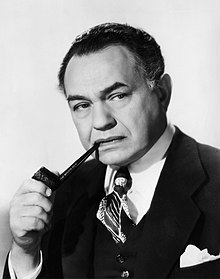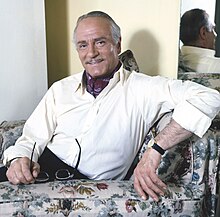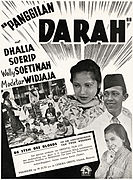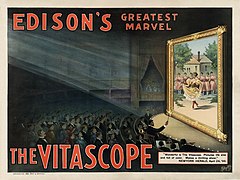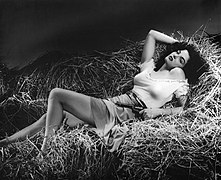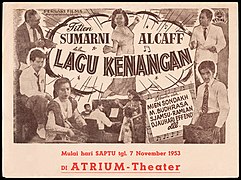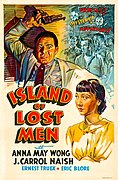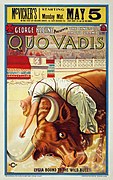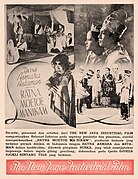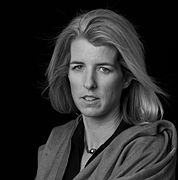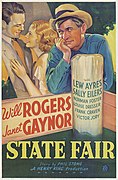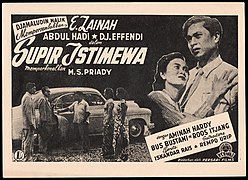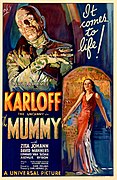Portal:Film
The Film Portal
 A film (British English) – also called a movie (American English), motion picture, moving picture, picture, photoplay or (slang) flick – is a work of visual art that simulates experiences and otherwise communicates ideas, stories, perceptions, feelings, beauty, or atmosphere through the use of moving images. These images are generally accompanied by sound and, more rarely, other sensory stimulations. The word "cinema", short for cinematography, is often used to refer to filmmaking and the film industry, and the art form that is the result of it. (Full article...)
A film (British English) – also called a movie (American English), motion picture, moving picture, picture, photoplay or (slang) flick – is a work of visual art that simulates experiences and otherwise communicates ideas, stories, perceptions, feelings, beauty, or atmosphere through the use of moving images. These images are generally accompanied by sound and, more rarely, other sensory stimulations. The word "cinema", short for cinematography, is often used to refer to filmmaking and the film industry, and the art form that is the result of it. (Full article...)
Featured articles -
Mike Bassett: England Manager is a 2001 satirical mockumentary comedy film directed by Steve Barron and starring Ricky Tomlinson, Amanda Redman, Bradley Walsh, Dean Lennox Kelly and Geoff Bell. The film follows Mike Bassett, who is appointed England manager having only previous experience of managing in the English lower leagues, he is tasked with guiding the team to qualification for the upcoming World Cup in Brazil. Journalist Martin Bashir provides voice-over, and the film features satirical cameo appearances from prominent figures in sport and entertainment such as Pelé, Ronaldo, Gabby Logan and Atomic Kitten. Minimal use of on-field action is employed, with the focus centred on behind-the-scenes events in boardrooms and the locker room.
The film initially received mixed reviews, but since its release has gained popularity as a cult film among English football fans. The film was followed by a television series, Mike Bassett: Manager in 2005. In 2014, there were plans to bring Mike Bassett back to the big screen in a movie titled Mike Bassett: Interim Manager. However, the kickstarter project that was essential for raising funds for the film did not meet its target. (Portal:Film/Featured content)
General images -
Selected image

Filmstrip of one of the three Monkeyshines films produced by Thomas Edison's laboratory in 1889–90 for the early cylinder version of the Kinetoscope.
Did you know...
- ... that in 1968, actor Ludovic Antal recited a Romanian nationalist poem in front of tourists from Soviet Moldavia, causing them to flee for their bus for fear of a "provocation"?
- ... that the original Green Goblin suit, created by Amalgamated Dynamics for Spider-Man, was scrapped after being deemed "too creepy" by studio executives?
- ... that French historian Patrice Gueniffey called the 2023 film Napoleon a "very anti-French and very pro-British" rewrite of history?
- ... that Fūka Izumi became a voice actress despite initially doubting that she could be one?
- ... that due to the COVID-19 pandemic, the nightclub scene in Simón used only 30 extras instead of the originally intended 250?
Selected biography -
Edward G. Robinson (born Emanuel Goldenberg; December 12, 1893 – January 26, 1973) was an American actor of stage and screen, who was popular during Hollywood's Golden Age. He appeared in 30 Broadway plays, and more than 100 films, during a 50-year career, and is best remembered for his tough-guy roles as gangsters in such films as Little Caesar and Key Largo. During his career, Robinson received the Cannes Film Festival Award for Best Actor for his performance in House of Strangers.
During the 1930s and 1940s, he was an outspoken public critic of fascism and Nazism, which were growing in strength in Europe in the years which led up to World War II. His activism included contributing over $250,000 to more than 850 organizations that were involved in war relief, along with contributions to cultural, educational, and religious groups. During the 1950s, he was called to testify in front of the House Un-American Activities Committee during the Red Scare, but he was cleared of any deliberate Communist involvement when he claimed that he was "duped" by several people whom he named (including screenwriter Dalton Trumbo), according to the official Congressional record, "Communist infiltration of the Hollywood motion-picture industry". As a result of being investigated, he found himself on Hollywood's graylist, people who were on the Hollywood blacklist maintained by the major studios, but could find work at minor film studios on what was called Poverty Row. (Full article...)Featured lists -

Several Indian individuals and films have received or been nominated for the Academy Awards (also known as the Oscars) in different categories. , 20 Indians have been nominated and 10 have won Oscars including in the scientific and technical category.
At the 30th Academy Awards, Mehboob Khan's 1957 Hindi-language film Mother India was India's first submission for the Academy Award for Best International Feature Film category. It was nominated alongside four other films and lost to the Italian film Nights of Cabiria (1957) by one vote. In 1982, The National Film Development Corporation of India was instrumental in co-producing Richard Attenborough's biographical film Gandhi. At the 55th Academy Awards, Bhanu Athaiya became the first Indian to win an Academy Award for designing the costumes. Ravi Shankar was nominated for Best Original Score for the same film. As of 2023, three Indian films have been nominated for Best International Feature—Mother India, Salaam Bombay! (1988) and Lagaan (2001). (Full article...)

A total of 112 fictional films are known to have been produced in the Dutch East Indies (modern-day Indonesia) between 1926 and the colony's dissolution in 1949. The earliest motion pictures, imported from abroad, were shown in late 1900, and by the early 1920s imported serials and fictional films were being shown, often with localised names. Dutch companies were also producing documentary films about the Indies to be shown in the Netherlands. The first reports of fictional film production in the Indies date from 1923, although the work in question was not completed. The first locally produced film, Loetoeng Kasaroeng, was directed by L. Heuveldorp and released on 31 December 1926.
Between 1926 and 1933 numerous other local productions were released. Although Dutchmen like Heuveldorp and George Krugers continued to be active in the industry, the majority of filmmakers and producers were ethnic Chinese. The Tan brothers (Khoen Yauw and Khoen Hian) and The Teng Chun were major producers during this period, while the Wong brothers (Nelson, Othniel, and Joshua) were among the more prominent directors. During the mid-1930s, production dropped as a result of the Great Depression. The release of Albert Balink's commercially and critically successful Terang Boelan (Full Moon) in 1937 led to renewed interest in filmmaking, and 1941 saw thirty locally produced films. This rate of production declined after the Japanese occupation beginning in early 1942, closing all but one film studio; this resulted in several films which had begun production in 1941 being released several years later. The majority of films produced during the occupation were short propaganda pieces. Following the Proclamation of Indonesian Independence in 1945 and during the ensuing revolution several films were made, by both pro-Dutch and pro-Indonesian backers; the Dutch formally recognised Indonesia's sovereignty on 27 December 1949, leaving the Dutch East Indies defunct. (Full article...)
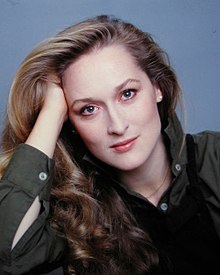
Meryl Streep is an American actress who has had an extensive career in film, television, and stage. She made her stage debut in 1975 with The Public Theater production of Trelawny of the 'Wells'. She went on to perform several roles on stage in the 1970s, gaining a Tony Award nomination for her role in 27 Wagons Full of Cotton (1976). In 1977, Streep made her film debut with a brief role alongside Jane Fonda in Julia. A supporting role in the war drama The Deer Hunter (1978) proved to be a breakthrough for Streep; she received her first Academy Award nomination for it. She won the award the following year for playing a troubled wife in the top-grossing drama Kramer vs. Kramer (1979). In 1978, Streep played a German, "Aryan" woman married to a Jewish man in Nazi Germany in the television miniseries Holocaust, which earned her a Primetime Emmy Award.
Streep established herself as a leading Hollywood actress in the 1980s. She played dual roles in the period drama The French Lieutenant's Woman (1981), and starred as a Polish Holocaust survivor in Sophie's Choice (1982). She was awarded the Best Actress Oscar for the latter. Streep portrayed the real-life character of Karen Silkwood in Mike Nichols' drama Silkwood (1983), before starring in her most financially successful release of the decade, the romantic drama Out of Africa (1985), in which she played the Danish writer Karen Blixen. With intermittent successes, Streep's career went through a period of relative decline post-1985, with several commentators criticizing her inclination towards melodramatic roles, despite her attempt at playing against-type in the comedies She-Devil (1989) and Death Becomes Her (1992). (Full article...)
Avatar: The Way of Water is a 2022 American epic science fiction film directed by James Cameron from a screenplay he co-wrote with Rick Jaffa and Amanda Silver, with a story the trio wrote with Josh Friedman and Shane Salerno. Produced by Lightstorm Entertainment and TSG Entertainment, and distributed by 20th Century Studios, it is the sequel to Avatar (2009) and the second installment in the Avatar film series. The film stars Sam Worthington, Zoe Saldaña, Sigourney Weaver, Stephen Lang, and Kate Winslet. It follows a blue-skinned humanoid Na'vi named Jake Sully (Worthington) as he and his family, under renewed human threat, seek refuge with the aquatic Metkayina clan of Pandora, a habitable exomoon on which they live.
Avatar: The Way of Water premiered in London on December 6, 2022, and was released in the United States on December 16. Produced on a budget of $350–460 million, The Way of Water grossed $2.320 billion, finishing its theatrical run as the highest-grossing film of 2022 and the third-highest-grossing film of all time. On the review aggregator website Rotten Tomatoes, the film holds an approval rating of 76% based on 449 reviews. (Full article...)

The filmography of English actor Robert Bathurst comprises both film and television roles spanning almost 30 years. Bathurst made his acting debut for television in 1982 in the never-broadcast pilot episode for the BBC sitcom Blackadder, though his character Prince Henry was recast when the Black Adder series was commissioned. Throughout the rest of the 1980s, Bathurst appeared in episodes of The Lenny Henry Show, Who Dares Wins, The District Nurse, Red Dwarf, and Chelmsford 123, before starring alongside his Cambridge Footlights colleague Stephen Fry in the short-run series Anything More Would Be Greedy. He also appeared in the films Whoops Apocalypse (1986) and Just Ask for Diamond (1988).
Into the 1990s, Bathurst gained wider recognition from television audiences, first as writer Mark Taylor in Joking Apart from 1991 to 1995, then as David Marsden in Cold Feet from 1997 to 2003 and again from 2016. The decade also saw him appear in the television series The House of Eliott, The Detectives, and Hornblower, and the films Twenty-One (1991) and Terry Jones's The Wind in the Willows (1996). (Full article...)

American entertainer Justin Timberlake has released four video albums and has been featured in thirty-seven music videos, seventeen films, fifteen television shows, and six commercials. He achieved early fame when he appeared in the Disney Channel television series The All-New Mickey Mouse Club, alongside singers Britney Spears and Christina Aguilera and actor Ryan Gosling. Timberlake rose to fame in the late 1990s as the lead singer of the boy band NSYNC. In 2002, he launched his solo career and released his solo debut single "Like I Love You", the music video for which was directed by Bucky Chrome. Francis Lawrence directed the video for "Cry Me a River". The video features Timberlake's character as he spies on a former lover, who according to the director portrays his former romantic interest Spears. At the 2003 MTV Video Music Awards, the video won the accolades for Best Male Video and Best Pop Video.
In 2005, Timberlake starred in the thriller Edison alongside Morgan Freeman and Kevin Spacey. The film received negative reviews from film critics and was a box office bomb. He then portrayed Frankie Ballenbacher in the crime drama Alpha Dog (2006); it received mixed responses from critics and attained box office success. The same year, Timberlake released his second studio album FutureSex/LoveSounds—four music videos for singles from the album were shot. Samuel Bayer directed the music video for "What Goes Around... Comes Around" (2007) in which American actress Scarlett Johansson plays Timberlake's love interest. From 2007 until 2009, he appeared in the music videos for his collaborations with other artists including 50 Cent ("Ayo Technology"), Madonna ("4 Minutes") and T.I. ("Dead and Gone"). (Full article...)
It was nominated for five Academy Awards, including Original Score, Achievement in Sound Editing, Achievement in Sound Mixing, Original Screenplay and Animated Feature Film, losing to Atonement, The Bourne Ultimatum and Juno, respectively, winning the latter one. Ratatouille was nominated for 13 Annie Awards, twice for the Best Animated Effects, where it lost to Surf's Up, and three times in the Best Voice Acting in an Animated Feature Production for Janeane Garofalo, Ian Holm and Patton Oswalt, where Ian Holm won the nomination. It won the Best Animated Feature Award from multiple associations including the Chicago Film Critics, the National Board of Review, the Annie Awards, the Broadcast Film Critics, the British Academy of Film and Television (BAFTA) and the Golden Globes. (Full article...)

Amitabh Bachchan is an Indian actor, occasional playback singer, film producer, television host and former politician who primarily works in Hindi films. He made his acting debut in 1969 with Saat Hindustani, and narrated Mrinal Sen's Bhuvan Shome (1969). He later appeared as Dr. Bhaskar Banerjee in Hrishikesh Mukherjee's Anand (1971), for which he won the Filmfare Award for Best Supporting Actor. In 1973, Bachchan played the role of Inspector Vijay Khanna in Prakash Mehra's action film Zanjeer. He has since appeared in several films with the character name "Vijay". During the same year, he appeared in Abhimaan and Namak Haraam. For the latter, he received the Filmfare Award for Best Supporting Actor. Two years later he appeared along with Shashi Kapoor, in Yash Chopra's Deewaar, which earned him the Filmfare Award for Best Actor nomination. He was caited as the "angry young man" for his roles in Deewaar and Zanjeer. Later he starred in Ramesh Sippy's Sholay (1975), which is considered to be one of the greatest Indian films of all time. After appearing in the romantic drama Kabhie Kabhie (1976), Bachchan starred in Manmohan Desai's action comedy Amar Akbar Anthony (1977). He won the Filmfare Award for Best Actor for his performance in the latter. He then played dual roles of Don and Vijay in Don (1978), which again earned him the Filmfare Best Actor Award for the consecutive year.
In the 1980s, Bachchan was cast in numerous films, including the action films: Dostana (1980), Shaan (1980) and Kaalia (1981), the romantic film Silsila (1981); and the drama Shakti (1982) with Dilip Kumar. Bachchan's popularity continued to increase in the early 1980s, and his critically and commercially successful ventures in this period include Dostana (1980), Shaan (1980), Ram Balram (1980), Naseeb (1981), Lawaaris (1981), Kaalia (1981), Yaarana (1981), Satte Pe Satta (1982), Namak Halaal (1982), Khud-Daar (1982), Andha Kanoon (1983) and Coolie (1983). His performances in these films were critically acclaimed, and his performances in Dostana and Shakti earned him the nominations for the Filmfare Award for Best Actor. He suffered a near-fatal injury while shooting for Coolie. His workload decreased for the upcoming four years (1984—1987), but he found critical and commercial success in Sharaabi (1984), Geraftaar (1985) and Mard (1985). He returned to the screen with the box-office success Shahenshah (1988). This was followed by critical and commercial failures, leading to a setback in his acting career. A year later, Bachchan played the role of gangster Vijay Deenanath Chauhan in Mukul S. Anand's Agneepath (1990) earned him the National Film Award for Best Actor and later starred in Hum (1991), which was a commercial success. Despite being a box-office failure, the former garnered him the National Film Award for Best Actor and has since developed a cult status. He also earned the Filmfare Award for Best Actor for Hum, following which he took another break from acting. He then played Badshah Khan in Anand's 1992 drama Khuda Gawah, for which he received a civilian award from the President of Afghanistan. Khuda Gawah, released on 8 May 1992, was also a critical and commercial success, and Bachchan's performance was well received both domestically and internationally. In 1996, he started his film production company Amitabh Bachchan Corporation whose first release Tere Mere Sapne (1996) was a box-office hit. Amitabh Bachchan is also known as the "Shahenshah" or "Big B" of Bollywood. (Full article...)
Laurence Olivier (1907–1989) was an English actor who, along with his contemporaries Ralph Richardson and John Gielgud, dominated the British stage of the mid-20th century. He also worked in films throughout his career, playing more than fifty cinema roles. From 1956 he performed in television roles, for which he won several awards.
In 1939 Olivier appeared in the film Wuthering Heights in a role that saw him nominated for the Academy Award for Best Actor. The following year he was again nominated for the same award for his portrayal of Maxim de Winter in Rebecca. In 1944 he produced, directed and appeared as Henry V of England in Henry V. The film was nominated for several Academy Awards, including Best Picture and Best Actor, although it failed to win in any competitive category; instead Olivier received a "Special Award" for his work on the film. His next film, Hamlet (1948), became the first non-American film to win the Academy Award for Best Picture, and he also received the award for Best Actor. In 1979 Olivier was presented with an Academy Honorary Award to recognise his lifetime of contribution to the art of film. In total he was nominated for nine other acting Academy Awards and one each for production and direction. For his stage work Olivier won three Evening Standard Theatre Awards and was nominated for a Tony Award. He made his television debut in 1956, and was subsequently nominated nine times for an Emmy Award, winning on five occasions; he was also nominated for two British Academy Television Awards for his work in the medium. (Full article...)
News
- September 2: Tributes paid to recently deceased US actor Chadwick Boseman
- October 7: Mockumentary Mister America has world premiere
- May 16: Actor Doris Day dies at 97
- January 22: Former U.S. intelligence agent Tony Mendez, architect of 'Argo' rescue, dies at 78
- Upcoming events
WikiProjects
Selected quote
Main topics
| Filmmaking |
|---|
 |
| Glossary |
- Terms - Animation • Beta movement • Camera • Cult film • Digital cinema • Documentary film • Dubbing • Experimental film • Fan film • Film crew • Film criticism • Film festival • Film frame • Film genre • Film journals and magazines • Film industry • Film manifesto • Film stock • Film theory • Filmmaking • History of film • Independent film • Lost film • Movie star • Narrative film • Open content film • Persistence of vision • Photographic film • Propaganda • Recording medium • Special effect • Subtitles • Sound stage • Web film • World cinema
- Lists - List of basic film topics • List of film topics • List of films • List of film festivals • List of film formats • List of film series • List of film techniques • List of highest-grossing films • List of longest films by running time • List of songs based on a film or book • Lists of film source material • List of open content films
Featured content
Subcategories
Subportals
Related portals
Things you can do
- Add
{{portal|Film}}to the See also section of film-related articles. - Tag the talk pages of film related articles with the {{WikiProject Film}} banner.
- Explore the list of English language films without an article
- Check tasks and announcements at WPFILM Announcements.
- Collaborate with other participants at Wikipedia:WikiProject Film.
- Join one of the task forces at Wikipedia:WikiProject Film/Sidebar.
Associated Wikimedia
The following Wikimedia Foundation sister projects provide more on this subject:
-
Commons
Free media repository -
Wikibooks
Free textbooks and manuals -
Wikidata
Free knowledge base -
Wikinews
Free-content news -
Wikiquote
Collection of quotations -
Wikisource
Free-content library -
Wikiversity
Free learning tools -
Wiktionary
Dictionary and thesaurus













































![Image 46Louis Poyet [fr]'s engraving of the mechanism of the "fusil photographique" as published in La Nature (april 1882) (from History of film technology)](http://upload.wikimedia.org/wikipedia/commons/thumb/f/f0/Fusil_photographique_Marey2.png/120px-Fusil_photographique_Marey2.png)


